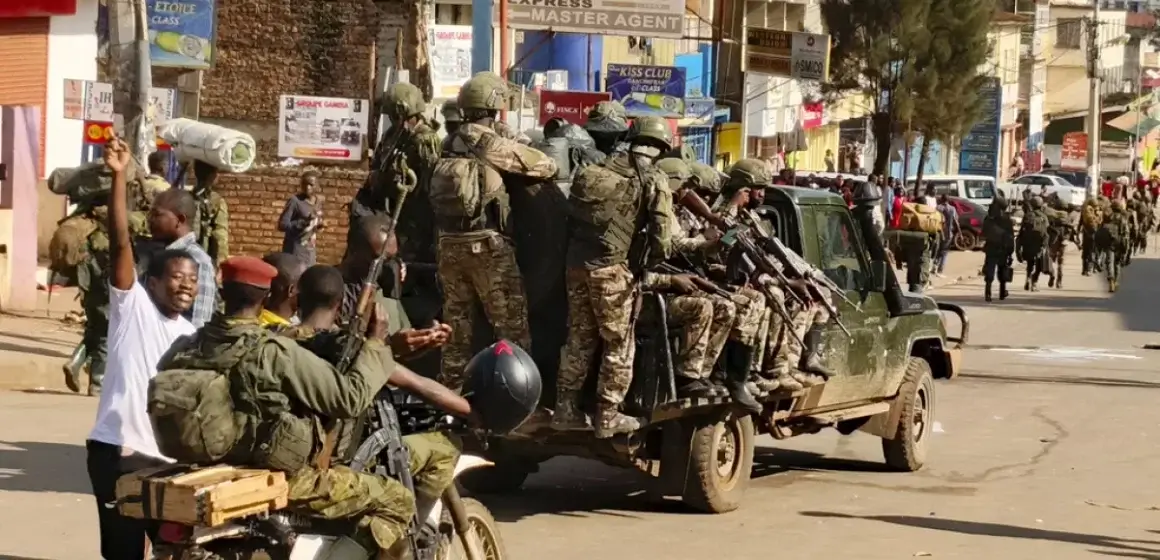|
LISTEN TO THIS THE AFRICANA VOICE ARTICLE NOW
Getting your Trinity Audio player ready...
|
Heavy gunfire echoed through the eastern Congolese town of Uvira Wednesday, February 19, as government troops and allied militia turned their weapons on each other, deepening the chaos caused by the rapid advance of the Rwanda-backed M23 rebels.
Local residents described scenes of looting, abandoned bodies strewn across the streets, and desperate attempts by soldiers to escape across Lake Tanganyika into Burundi. The violence came as the M23 insurgents, emboldened by their recent conquests, pushed further south, tightening their grip on the region.
The rebel group’s swift and aggressive campaign has plunged the Democratic Republic of Congo (DRC) into one of its most serious security crises in recent years. M23 captured Bukavu, the capital of South Kivu province, over the weekend—marking the biggest territorial loss for the Congolese government since the fall of Goma in January. With Bukavu under rebel control, panic spread in nearby towns, and on Tuesday, M23 fighters reportedly entered Kamanyola, a town located just 80 kilometers from Uvira.
While the government had hoped to mount a counteroffensive against M23, its own forces have fractured. The Congolese army (FARDC) and their supposed allies, the Wazalendo militia, have turned against each other in a struggle over strategic retreat and control.
“We woke up to the sound of gunfire, but it wasn’t from the rebels—it was from those who were meant to protect us,” said a local official, speaking on condition of anonymity. “The army and the Wazalendo are fighting among themselves, leading to casualties and destruction.”
Eyewitnesses reported that chaos erupted as government troops clashed with the militia, leaving bodies in the streets and stores ransacked. According to a humanitarian worker in Uvira, at least 30 bodies had been taken to the town’s morgue, while over 100 wounded people were receiving treatment for serious injuries. However, these figures could not be independently verified.
While the anarchy continues, hundreds of Congolese police officers have fled across the border into Burundi, where they were swiftly disarmed by Burundian authorities. The fleeing forces included 228 Congolese soldiers who had been imprisoned for desertion but were suddenly freed when Uvira’s main prison was emptied amid the unrest. It remained unclear whether the prisoners had escaped or had been deliberately released.
The deteriorating security situation has paralyzed humanitarian efforts in the area. Doctors Without Borders (MSF) reported that its medical teams in Uvira had been forced to reduce operations due to the fighting and widespread looting. Armed groups blocked ambulances, leaving the wounded stranded without proper medical care.
Meanwhile, desperate soldiers sought to escape the besieged town by any means possible. One security source described scenes of soldiers pushing civilians aside as they rushed to board boats across Lake Tanganyika. “People were screaming and running in every direction. Soldiers were firing their guns in the air to clear their way onto boats, leaving behind civilians with nowhere to go,” the source said.
The rapid advance of M23 has raised concerns beyond Congo’s borders, with fears that the conflict could spiral into a wider regional war. The rebel group, which claims to represent the interests of Congolese Tutsi communities, has a long history in the region. It emerged from the remnants of earlier insurgencies tied to the ethnic and political tensions that have plagued eastern Congo since the 1994 Rwandan genocide.
Kinshasa has repeatedly accused Rwanda of providing military and logistical support to M23, allegations that both Kigali and the United Nations have acknowledged as credible. Rwanda, however, denies any involvement, insisting that it is merely protecting itself from Hutu rebel groups operating in Congo.
The Congolese government has scrambled to find external military support to counter M23’s gains. Officials in Kinshasa have reportedly sought assistance from Chad, though Chadian authorities have downplayed the likelihood of direct intervention.
As fighting continues in both South Kivu and North Kivu provinces, tensions have reached a boiling point across the country. In the capital, Kinshasa—more than 1,600 kilometers away—residents have been gripped by uncertainty, with some openly discussing the possibility of a coup. Many families are now considering leaving the country altogether.











LEAVE A COMMENT
You must be logged in to post a comment.